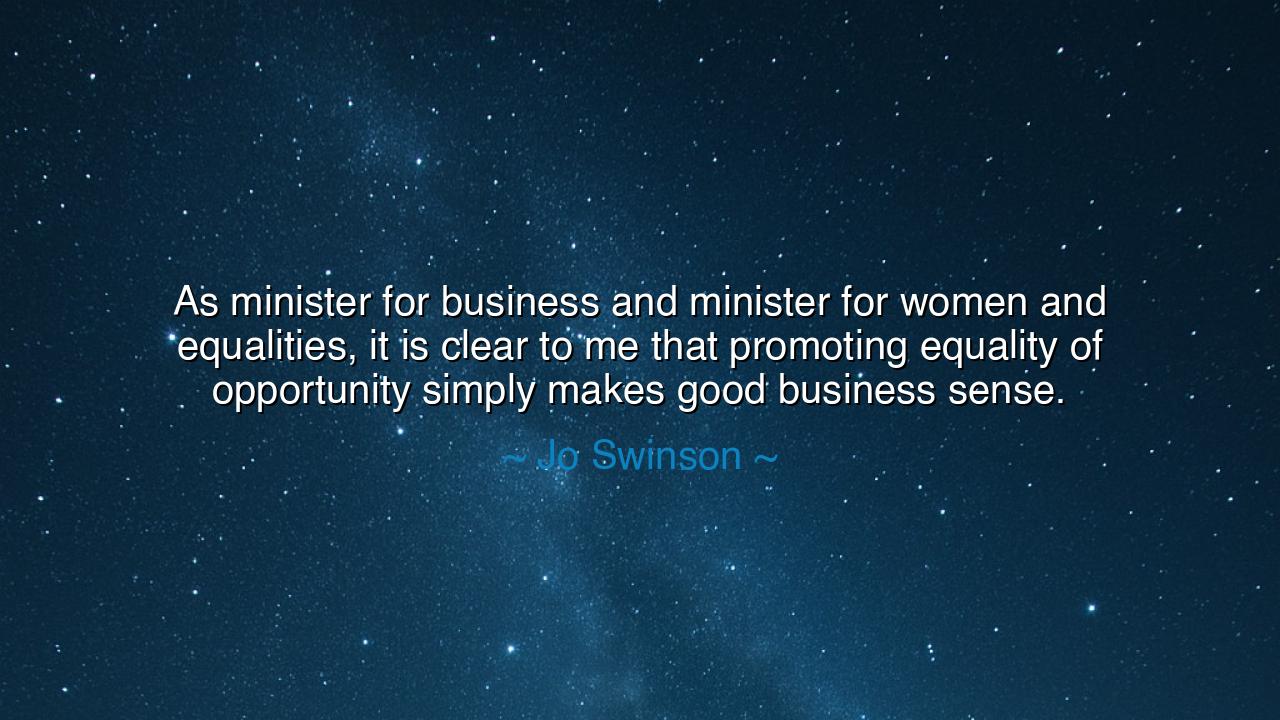
As minister for business and minister for women and equalities
As minister for business and minister for women and equalities, it is clear to me that promoting equality of opportunity simply makes good business sense.






In the great tapestry of human society, the pursuit of equality has always been a noble and essential endeavor, not merely for the sake of fairness but for the very prosperity of nations. The words of Jo Swinson—"As minister for business and minister for women and equalities, it is clear to me that promoting equality of opportunity simply makes good business sense"—resonate deeply with an ancient truth: that true prosperity and success are built not on the exclusion of some, but on the inclusion and empowerment of all. Her statement draws from the very essence of human progress, showing that when we work towards equality, not only does society benefit, but so too does the very fabric of our economies and businesses.
In the ancient world, leaders often understood that a society’s prosperity was intricately linked to its sense of justice. Plato, in his vision of the ideal state in The Republic, spoke of a society where individuals were placed in roles not based on their birth but on their ability and talent. He recognized that when people are allowed to contribute according to their strengths, society as a whole flourishes. Socrates, too, emphasized the importance of justice in all realms of life, from personal conduct to societal organization. His belief that the well-being of the state depended on fairness and equality was a foundation for many of the great leaders of the ancient world who sought to empower their people, knowing that the strength of the whole depended on the potential of every individual.
Jo Swinson's words echo this ancient wisdom, suggesting that equality of opportunity is not just a moral imperative, but a pragmatic necessity for success in the modern world. Equality fosters innovation, creativity, and the free flow of ideas, all of which are crucial for business success. When a society or business excludes a portion of its population—whether by gender, race, or other factors—it stifles its potential. The most successful ventures throughout history have always been those that were open to all, that allowed talent to rise from any corner, from the humblest beginnings to the grandest heights. Just as the great empires of old flourished when they embraced the talents of diverse peoples, so too can modern businesses thrive when they embrace equality in their operations and leadership.
Consider the example of Henry Ford, the great industrialist who revolutionized the automobile industry not just with his innovative thinking, but by creating an environment where people were rewarded based on merit and not their social standing. His introduction of the assembly line and his commitment to paying workers well, regardless of their background, transformed the car industry and American business as a whole. Ford’s success came from his belief that opportunity should be available to all, and that when people are given the tools to succeed, they will do so. This belief in equality of opportunity—not just as a moral ideal, but as a core business strategy—led to unprecedented growth and prosperity for his company.
Swinson’s assertion also draws attention to an uncomfortable truth: that the failure to embrace equality is not just an ethical issue, but a business flaw. Businesses that do not open the door to diverse voices, experiences, and ideas are ultimately limiting their potential for growth. Women and minorities, when excluded from decision-making processes or leadership roles, are denied the chance to contribute their full potential. In the end, the business suffers, the economy suffers, and society suffers. This is why equality of opportunity is not merely a lofty ideal—it is an essential practice for the sustainability and flourishing of any enterprise, nation, or community.
The lesson we must carry from Swinson’s words is that equality is not a luxury to be sought when times are good, but a necessity for sustained prosperity. If businesses and societies truly wish to thrive, they must actively seek to create opportunities for all individuals, regardless of their gender, race, or background. This is not a kindness; it is a strategic choice. History has taught us that the most enduring and prosperous civilizations and businesses are those that are built on a foundation of inclusion and fairness. The ancient empires, though often flawed in their treatment of certain groups, nevertheless thrived when they recognized and utilized the talents of all their people, regardless of their social standing.
In your own life, reflect on how you can contribute to the promotion of equality of opportunity in your work, in your community, and in your relationships. Whether through mentorship, education, or simply by ensuring that everyone has the chance to contribute their ideas and skills, remember that inclusivity is not just an ideal, but a force for progress. When we open the doors of opportunity to all, we unleash the full potential of humanity, and it is this unleashed potential that will propel us toward a more prosperous and harmonious future. Just as Swinson advocates for equality in business, so too must we strive for equality in every facet of our lives, knowing that this is the key to success—both personal and collective.






AAdministratorAdministrator
Welcome, honored guests. Please leave a comment, we will respond soon